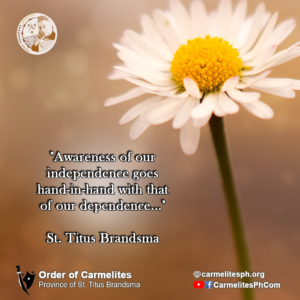
From her life before the Face of God, and her love and admiration for His power and majesty a third idea springs forth, fitting remarkably well into the [104] scheme of the Order. I mean the idea of her own nothingness compared with God, her wonderful consciousness of her own smallness and slightness, her humility and her conception of herself as being only a child. This characteristic is often met with in the older saints of the Order, as simplicity and humility are the special hallmarks of the Order. How has Blessed John Soreth not stressed this speciality! Cardinal Gasquet quite pithily points out the characteristics which distinguish the Order of Carmel from the various other Orders: Simplices et sinceri. The life of little St. Therese has indeed given this phrase a peculiar weight and strength. It is so often said by various Carmelite spiritual authors – and it tallies so well with our spirit – that the Order is not called to do great things, to be spoken of, but to make itself loved and attractive by doing ordinary things well, without much talking or noise; to live in a certain seclusion for and with God more than for and with men; to attach value to what God desires more than to what man sets high store by. The first demand of the school of Carmel is a silent introversion in order to live in and with God. From this contemplation springs the feeling of smallness and nothingness, modesty and simplicity. “Unless you become like little children, you shall not enter into the Kingdom of Heaven.” In the Collect of the Mass of the Little Flower (Oct. 3rd) the Church expressly mentions these words of Our Lord, so that with the help of St. Therese we may be able to lay these difficult yet necessary foundations for the house of our sanctity.”
St. Titus Brandsma
What do you think of this quote? Write it on the comment section.
📸 Thea Hdc | Unsplash


